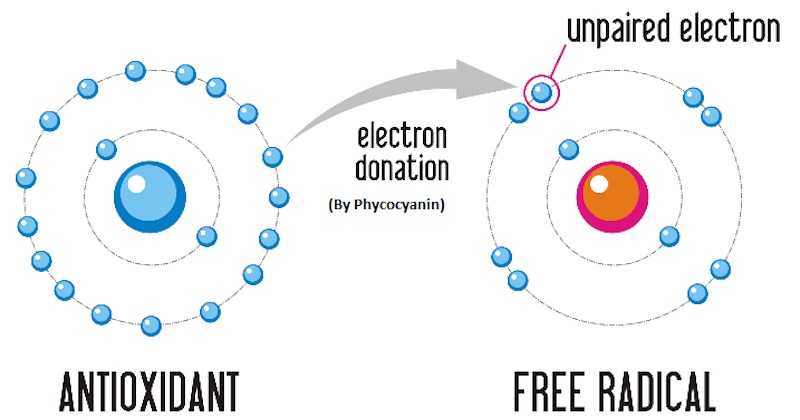An Easy-To-Understand Guide to Antioxidants
Last updated on
You’ve probably been hearing the term “antioxidants” a lot lately, but really, what’s so bad about oxidants and oxidation?
Oxygen is a double-edged sword. You will not survive without it, but having too much of it will damage your cells. Biological oxidation hastens your aging process in the same way that a slice of apple turns brown from exposure to the air.
When your body is exposed to environmental toxins such as chemicals, cigarette smoke, radiation, and sun exposure, oxidative molecules known as free radicals are formed. Free radicals are also produced during energy production, metabolism, exercise, and when you have inflammation in your body.
A free radical is a highly reactive metabolite—a substance produced during metabolism—missing one or more electrons. The missing election is largely responsible for biological oxidation.
Free radicals attack other molecules in order to find replacements for their missing electrons. After a molecule’s electron has been stolen by a free radical, it becomes a new free radical and continues to attack other molecules.
Free radicals can damage your cells and DNA in many different ways. Lipids in cell membranes are susceptible to oxidative damage because free radicals have a tendency to gather in cell membranes. A cell membrane oxidized by a free radical becomes brittle and leaky and eventually dies.
How Antioxidants Support Your Health
Antioxidants are molecules that have the ability to inhibit the oxidation of another molecule by sacrificing their own electrons to feed free radicals. They “donate” their electrons without becoming free radicals themselves.
Your body naturally circulates a number of nutrients that possess antioxidant properties and manufactures antioxidant enzymes in order to fend off the attacks of free radicals. However, this ability declines as you age.
Daily exposure to the pollutants found in air, food, and water contribute to oxidative stress, the state in which free radicals outnumber your natural antioxidants.
Consuming fresh organic fruits and vegetables uncooked provides your body with potent phytochemicals that act as antioxidants. Dr. Joseph Mercola recommends juicing vegetables to boost your antioxidant levels.
The health benefits of antioxidants in the body
Aside from slowing down the onslaught of free radicals, antioxidants also help:
- Chelate and expel toxic metals
- Protect your DNA
- Repair damaged molecules
- Stimulate gene expression to boost your immunity
- Trigger the self-destruction of harmful cells
Classification of Antiodidants
Antioxidants can be classified in terms of their types, sizes, and solubility.
Type
Enzymatic antioxidants like catalase, glutathione peroxidase, glutathione reductase, and superoxide dismutase are produced by your body to break down and remove free radicals. Enzymatic antioxidants cannot be supplemented orally.
On the other hand, non-enzymatic antioxidants like carotenoids (astaxanthin), polyphenols, glutathione (GSH), vitamin C, and vitamin E are mostly found in food and supplements and work by interrupting free radical chain reactions.
Size
Small-molecule antioxidants scavenge free radicals and carry them away through chemical neutralization. Examples of small-molecule antioxidants are carotenoids, CoQ10, glutathione, lipoic acid, vitamin C, and vitamin E.
Large-molecule protein antioxidants tend to be “sacrificial proteins,” like albumin and enzymatic antioxidants that absorb free radicals to prevent them from attacking your DNA and essential proteins.
Solubility
Hydrophilic antioxidants like anthocyanins, polyphenols, and resveratrol are soluble in water are found in aqueous fluids such as your blood and the fluids within and around your cells. Hydrophobic antioxidants like astaxanthin, vitamin A, and vitamin E are lipid-soluble and are found in your cell membranes.
If you’re taking antioxidant supplements, minimizing your sugar consumption will help make these antioxidants work better and last longer. Exercise actually causes oxidative stress, but doing short amounts of high-intensity interval workouts will help improve your body’s ability to produce antioxidants.
Some of the links I post on this site are affiliate links. If you go through them to make a purchase, I will earn a small commission (at no additional cost to you). However, note that I’m recommending these products because of their quality and that I have good experience using them, not because of the commission to be made.



































 JOIN OVER
JOIN OVER
Comments